COVID-19 recovery, healthcare quality and access, taxes, and housing serve as major themes in leadup to the election
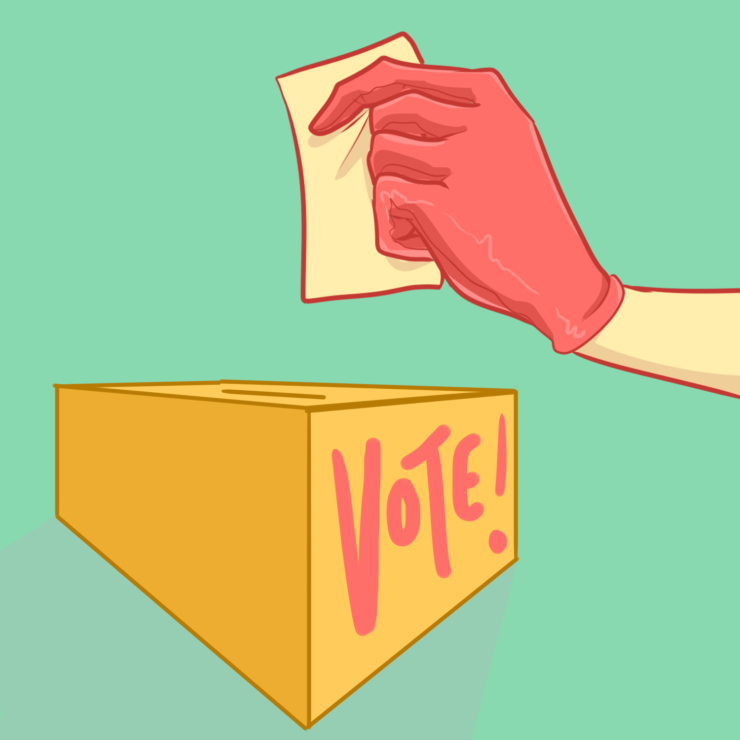
With a provincial election fast approaching on Oct. 24, B.C.’s parties have been busy making a lot of campaign promises. While parties compete for voters’ favour, polls estimate that the New Democratic Party’s (NDP) odds of winning the most seats are around 95 per cent.
Voting will look a little different this year, but can still be done by mail-in ballot or in person at a polling station, where COVID-19 safety protocols will be in place.
Though the three main parties (and the province’s many independent candidates) emphasize COVID-19 recovery, affordability, and healthcare, they present very different visions for the province. To help sort through the parties’ many promises, the Martlet has looked through election platforms to highlight some of the key commitments made.
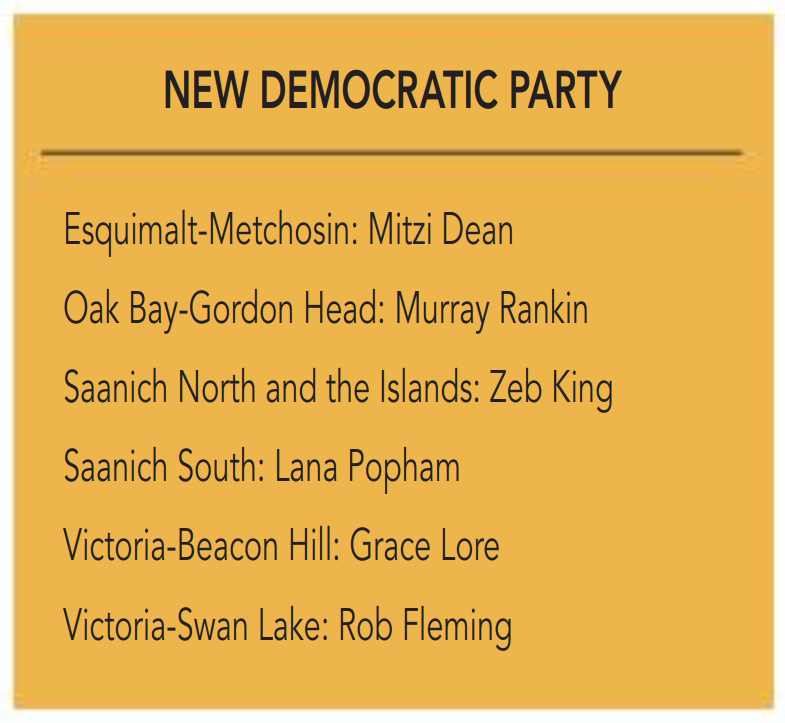
The BC NDP have put forward a number of campaign promises under their plan’s “guiding principles” of affordability, reconciliation, climate change mitigation, and worker and small business-focused recovery. The NDP formed a minority government in 2017 through an agreement with the B.C. Greens.
For students, the NDP have promised to expand eligibility to the BC Access Grant to include more middle-income students. The grant, which was introduced in the 2020 budget, provides students with up to $4 000 a year based on family income and program length. The NDP also promises to provide a tuition waiver to all former youth-in-care — allowing youth from the foster care system to attend postsecondary for free.
On housing, the NDP platform includes keeping the current pause on rent increases until the end of 2021, permanently tying maximum rent increases to inflation, and providing a renter’s rebate of $400 for households earning less than $80 000.
The NDP platform emphasizes healthcare, promising expanded mental health support for children and young adults and increasing access to online counselling. The NDP platform includes free access to contraception and a COVID-19 vaccine, if and when one is developed.
On environmental issues, the NDP have promised to pass legislation requiring B.C. to reach net-zero carbon emissions by 2050. They also promised to eliminate single-use plastics, though the federal government has since announced this will be required Canada-wide by 2021.
The platform also highlights the NDP’s commitment to the LNG Canada project, which includes the Coastal GasLink pipeline that has been subject to controversy over its record on Indigenous sovereignty.
The NDP’s commitments on Indigenous self-determination centre around continuing the decision-making and consultation processes they have used while in government and expanding support for Aboriginal Friendship Centres and cultural revitalization.
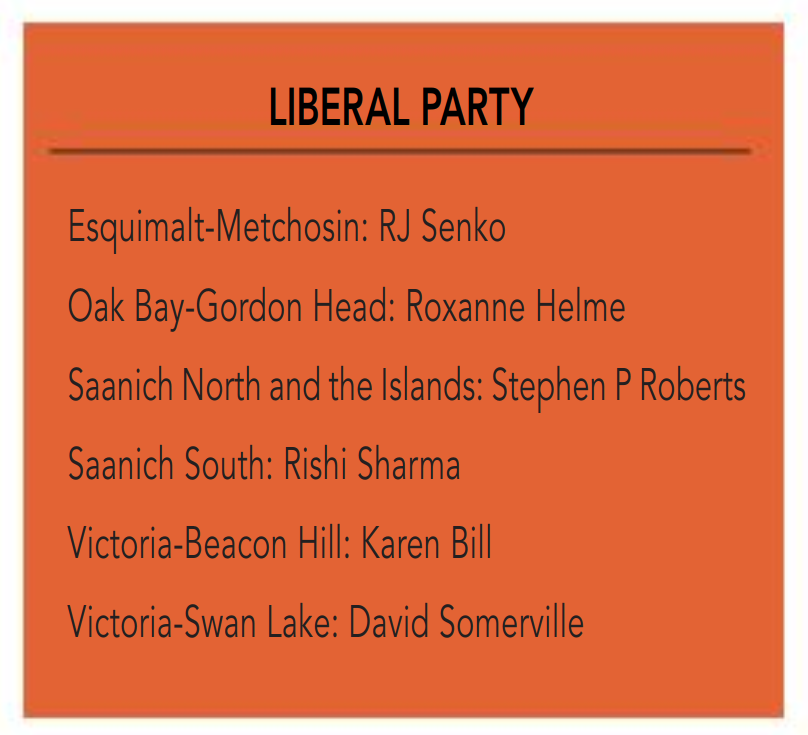
Meanwhile, the BC Liberal Party has promised to “rebuild B.C.” by cutting taxes and providing support to small businesses and other economic sectors. Their platform also has promises for affordable housing, childcare, seniors, mental health, and crime reduction. Since the 2017 election, the Liberals have been the official opposition party.
The Liberals’ marquee promise is to eliminate the provincial sales tax (PST) for a year before reintroducing it at a rate of three per cent, down from the current seven per cent. They say this would not affect government spending.
Another key promise from the Liberals is to take away the provincial monopoly on auto insurance from ICBC. The party says that this will reduce rates and give drivers choices when it comes to insurance plans.
On education, the Liberals emphasize the trades and healthcare. They promise to streamline registrations and credentials for apprenticeship training and to bring trades competency into the school system. In response to the shortages of healthcare professionals highlighted by the pandemic, the Liberals promise to increase spaces for doctors, nurses, and other healthcare professionals. Their platform also includes a proposal to create a new Work Experience for Students program, which will include co-ops and job-creation programs when unemployment rates are high.
The Liberals’ platform also makes mental health a priority with the inclusion of promises to boost mental health resources at post-secondary institutions as well as to create a Safe Care Act which will make sure young people with addictions get treatment safely and ethically.
On housing, the Liberals say they will suspend fees for building projects to encourage the development of affordable housing. Their platform also includes financial support for landlords and incentives for local communities to approve more rental units and diversified housing.
The Liberals also state they will review the operation of long-term care homes in the province and ensure adequate staffing and access to personal protective equipment. They have also promised to bring back Medical Service Plan premiums and make flu shots free for all British Columbians.
On policing, the Liberal platform includes an increase of $58 million in public safety funding and a commitment to hire 200 more police officers. The party also says they will establish more Mobile Crisis Response Teams for the purposes of mental health calls.
The Liberals’ key environmental promises include encouraging the retrofitting of homes and businesses, increasing the number of electric car charging stations in the province, and protecting wetlands.
On Indigenous issues, the Liberals say they will work with Indigenous peoples to enhance cultural and environmental understanding as well as to clearly define the United Nations Declaration on the Rights of Indigenous Peoples (UNDRIP).
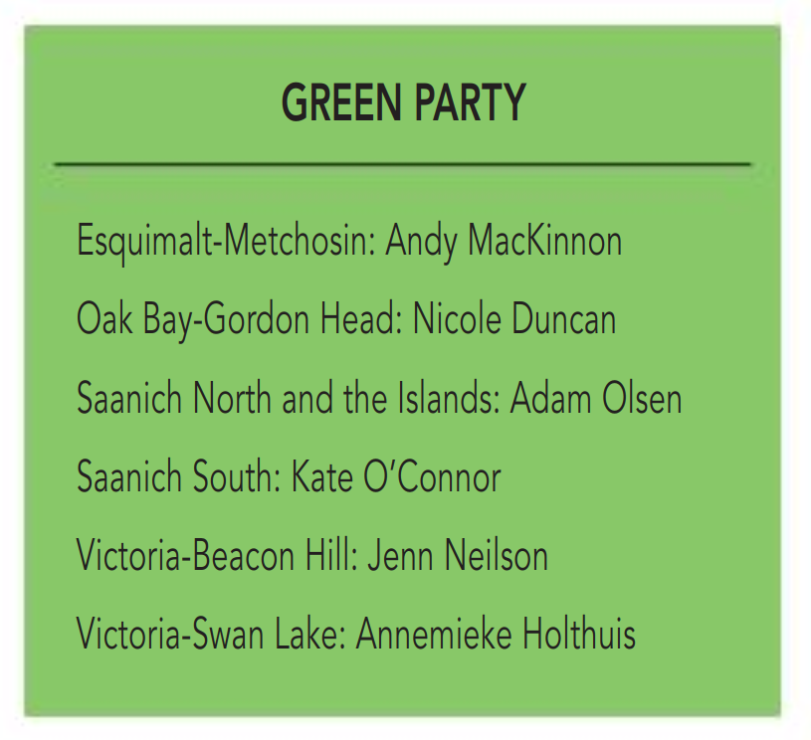
The BC Green Party has focused its platform on promoting sustainable recovery from the COVID-19 pandemic, making cities more livable, and fostering community self-reliance.
For students, the Greens will double the funding of the BC Access Grant and develop new resources for students with special needs. The Greens also promise to provide more counsellors in schools and work on addressing racism in K-12 education.
On housing, the Greens promise to introduce a rental supplement for all renters as well as an additional grant for those paying more than 30 per cent of their income on rent.
The Greens say that the COVID-19 pandemic provides a unique opportunity for the province to rebuild sustainably and meet environmental goals. They have promised to make B.C. carbon neutral by 2045. The party says this will be accomplished through a rapid electrification of transportation, investment in innovative climate solutions, and the transition of workers in the oil and gas sector to clean energy jobs.
In the short term, the Greens plan to make cities more liveable and sustainable. They would invest in bike lanes, trails, parks, community spaces, pedestrian-only streets, and better regional transit systems. The Greens have also promised to make the extension of restaurant patios and pedestrian only streets permanent and to make electric bikes more accessible by exempting them from PST and increasing storage options.
As well, the Greens have promised to implement a long-term food sustainability strategy that provides access to high quality, healthy food for low-income British Columbians. This plan will also provide incentives for environmentally-friendly farming methods and local agricultural processing. The Greens also say they will protect old-growth forests, restore habitats, and protect watersheds.
In terms of B.C.’s Indigenous communities, the party has promised to work with First Nations communities to undertake landscape-level ecosystem-based planning, reforestation, and restoration, and to return land to them through the redistribution of land tenures from a few major companies.
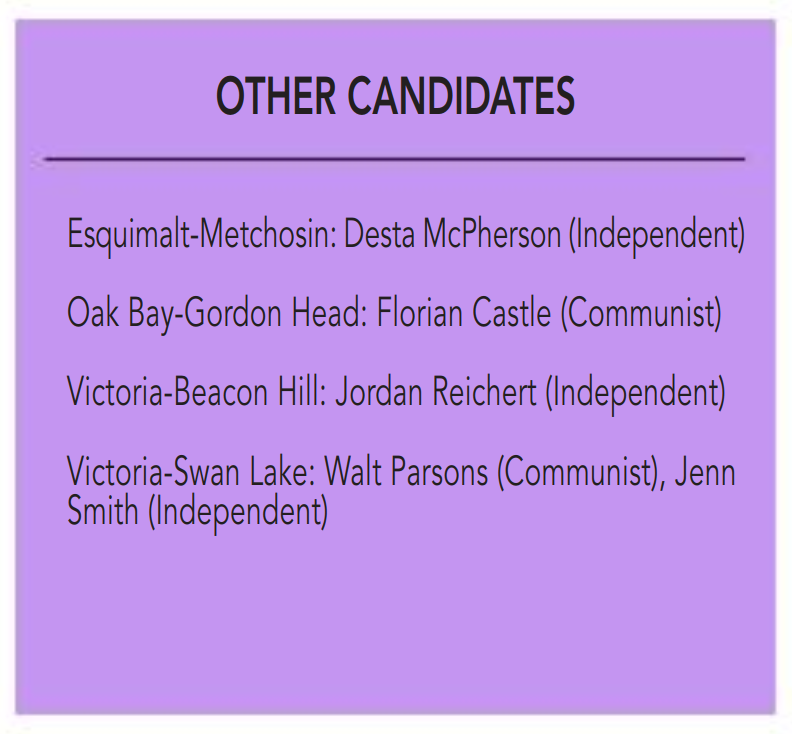
In case the three main parties’ platforms have left you wanting more, the ridings in Greater Victoria have five candidates running independently or for other parties.
The Martlet attempted to find information about Desta McPherson. McPherson does not have an online presence and, in all references to them in other news outlets, could not be contacted for an interview.
The Communist Party of BC, who have candidates in two Greater Victoria Area ridings, call for a $20 minimum wage, increased taxation of companies and high-income people, and the construction of 100 000 affordable housing units. Their platform promises to stop construction on the Site C Dam, Coastal GasLink pipeline, and Trans Mountain pipeline expansion. The Communist Party also supports full recognition of Indigenous title, defunding of the police and military, and moving to a proportional representation electoral system.
Jenn Smith, an independent candidate running in Victoria-Swan Lake, opposes the inclusion of sexual orientation and gender identity education in the B.C. curriculum and the policies that allow transgender youths to transition. Smith, who is trans, has spoken extensively on these topics. He also supports greater citizen input in the governing process and promises to support increased public consultation on issues.
Jordan Reichert, who is running as an independent in Victoria-Beacon Hill, has previously run in municipal and federal elections with a focus on animal rights. This is still a focus of Reichert’s campaign, which also emphasizes universal basic income, mental health support, and protection of old-growth forests.
Voters can register to vote, request a mail-in ballot, and find other information about voting at elections.bc.ca or by calling 1-800-661-8683.







